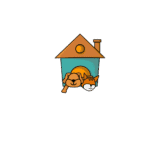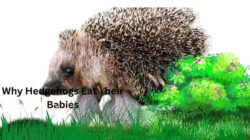Do you want to discover why hedgehogs eat their babies?
This happened for the first time when my female hedgehog gave birth. I was overjoyed and couldn’t wait to tell everyone the wonderful news.
I requested my vet to come inspect my pet, only to discover that only three of her four litters were still alive. I was distraught.
My veterinarian was able to enlighten me further on this and how to avoid it. I’d like to share it with you and also encourage you to read my post How Much Does A Baby Hedgehog Pet Cost
Let’s get started,
Is It Normal For Hedgehogs To Eat Their Babies
Having a maternal impulse to safeguard our children is natural. Some hedgehog moms, on the other hand, will go over and beyond the call of duty and even consume their offspring.
This is a normal part of the hedgehog’s existence, although it only occurs when stressed.
Hedgehogs should never devour their babies. They devour their kids when they are upset and fear for their babies’ lives—after all, nutrients absorbed into their bodies are preferable to nutrients going to a predator.
It’s important to emphasize that these circumstances are uncommon, and most hedgehog moms successfully care for and protect their offspring.
Cannibalistic behavior may be reduced by providing a comfortable and stress-free environment for the mother hedgehog, guaranteeing sufficient nourishment, and monitoring their well-being.
It is critical to keep the surroundings as calm as possible until the babies are at least 10 days old, but it will be good to go for two weeks to be cautious. Keep the house peaceful for a few days before the delivery.
Try again in three months if the mother ate all of the babies. If she continues to eat the kids even in a peaceful setting, she may not be ready for motherhood.
What Are Some Indicators That A Hedgehog Mother May Be Eating Her Babies
There are a few signs to check for if you believe a hedgehog mother is eating her babies:
Missing or vanishing babies: If some or all of the young hedgehogs are missing from the nest and there are no obvious traces of them being relocated or captured by other predators, there is a possibility that the mother has devoured the babies
Blood stains: If you find bloodstains or half-consumed remnants of newborn hedgehogs in or around the nest, it is quite likely that the mother has been devouring them.
Aberrant behavior: The mother hedgehog may exhibit aberrant behavior like as dragging about dead or damaged offspring, aggressively hunting them down, or displaying aggressiveness towards them.
Aggression or excessive grooming: If the mother shows violent behavior towards her young, such as biting or assaulting them, or if she grooms them excessively, this might be a symptom of probable cannibalistic inclinations.
Neglect or rejection: If a mother ignores or rejects her offspring, refuses to feed them, or pushes them away, it may suggest a lack of maternal instinct or a danger of cannibalism.
Unusual noises: If you hear disturbed or odd noises coming from the hedgehog nest, such as continual screaming or weeping, it might mean that the mother is injuring or devouring her offspring.
Why Can’t You Touch Baby Hedgehogs
We should not touch the babies because we will imbue them with a fragrance that will cause the mother to recognize them as outsiders and kill or reject them from the nest.
If this occurs, we must remove the rejected baby and place it back inside the nest, between its siblings, with a spoon previously rubbed with the nest substratum, so that it is once again impregnated with the regular litter fragrance.
If the desertion continues and the baby is ejected from the nest, we will have to nurture and feed it artificially, or it will end up dying from starvation.
Is It Typical For New Mom Hedgehogs To Consume Their Babies
In a nutshell, yes. My breeder taught me that every litter is fragile. Some moms may have a litter when all of the kids are okay but then consume one or all of the infants in their next litter.
Sometimes the mother would eat all except one, or only one, as was the case in my instance.
There is no explanation for why this occurs, only guesswork. Of course, this is concerning, but you may rest assured that this is not unusual hedgehog behavior.
However, a mother hedgehog may do this under specific circumstances, such as if the young ones are unwell or malformed so that the hedgehog can transfer resources (milk, care) to those who are certain to survive, or if the mother hedgehog suffers from a lack of protein and microelements in the body, which were mostly used in the production of embryos/cubs, or if it a young female with a lack of maternal impulses, and if she is hungry or under stress. To lessen the possibility of this happening, ensure that a mother hedgehog has appropriate nourishment and a suitable living habitat.
Reasons Why Hedgehogs Devour Their Babies
Stress: Excessive stress can lead to strange behavior in a mother hedgehog, including cannibalism. Stressors might include environmental disruptions, excessive handling, or a lack of privacy.
Lack of resources: If the mother hedgehog is underweight or does not receive appropriate nutrients, she may resort to devouring her kids as a survival instinct.
This can occur if the mother cannot get adequate food or if her nutritional demands are not satisfied.
Illness or deformities: If a mother hedgehog’s young are unwell, weak, or have deformities, she may devour them.
This is thought to be a sort of natural selection in which the mother removes children who are unlikely to survive.
Lack of maternal instincts: A first-time mother hedgehog may occasionally lack the necessary maternal instincts to care for her pups. This can lead to neglect and even cannibalism.
If you are concerned about the behavior of a hedgehog mother, it is best to speak with a veterinarian or an experienced hedgehog breeder.
What Can I Do To Ensure The Well-Being Of My Hedgehog’s Offspring
Create an appropriate nesting environment: Use soft bedding materials, such as fleece or paper-based bedding, to provide a warm and comfy nesting place for the mother hedgehog.
To minimize distractions, place the nest in a calm and safe spot. For the best bedding for your hedgehog, I recommend you read Hedgehog Pet Bedding Needs
Maintain good nutrition: During pregnancy and breastfeeding, the mother hedgehog needs a well-balanced diet.
Provide her with high-quality hedgehog-specific food, which should include a combination of proteins, lipids, and carbs. It’s also a good idea to contact a veterinarian to verify you’re addressing your hedgehog’s unique dietary demands.
Avoid stress and disturbances: Hedgehogs are susceptible to stress, which can have an impact on their health and the health of their children.
Reduce loud noises, unexpected movements, and other stressors in the vicinity of the mother hedgehog’s nesting place.
Monitor the mother’s behavior: Pay close attention to the mother hedgehog to ensure she is adequately caring for her young.
She should be breastfeeding them frequently, as well as keeping them warm and combing them. If you observe any symptoms of neglect or aggressiveness, you may need to intervene or seek the help of a veterinarian.
If you see any of these symptoms, you must act quickly. Remove any surviving kids from the mother to protect their safety, and get advice from a veterinarian or a seasoned hedgehog breeder on how to continue.
These behaviors are uncommon in hedgehogs, and most mothers do not eat their young unless there are underlying concerns such as stress, disease, or insufficient care.
Conclusion
The fact is that it is unclear, but several specialists have compiled a list of plausible explanations.
Knowing them can lessen the chances of a female hedgehog eating the babies when they are born.
Despite our best efforts as hedgehog owners, animals are unpredictable in some situations. Even if precautions are taken, the female hedgehog may opt to devour the offspring. It doesn’t have to happen, but sadly, things do.
It’s best for hedgehog caretakers to ensure that all components are in place for mum to have a tranquil and stress-free environment in which to deliver and nurture her young.

